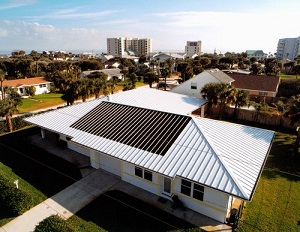Florida makes good—partly—on solar rebates
 Florida’s legislature recently approved $29 million in additional funding for the state’s solar rebate program. But it still falls far short of funding the entire $52 million backlog of rebates promised to homeowners that installed solar on their homes and properties.
Florida’s legislature recently approved $29 million in additional funding for the state’s solar rebate program. But it still falls far short of funding the entire $52 million backlog of rebates promised to homeowners that installed solar on their homes and properties.
The funding comes from $31 million in federal stimulus funds. The funds will be distributed evenly among Floridians who successfully applied for the program but had not yet received funds, according to The Florida Independent. Each will receive slightly more than half the total amount they expected under the program.
“We think it’s very evident to those of us in the industry that the rebate program has been a chess piece between the governor and the legislature,” said Mike Antheil, executive director of the Florida Alliance for Renewable Energy. “14,000 or 15,000 people were owed a rebate they haven’t received…after they put faith in our state government. It’s only a step, not the solution.”
People who were approved for the rebate may yet receive the full amount.
Antheil noted that the legislation passed had nothing in it that would preclude those applicants from receiving the full amount, but he’s not optimistic.
“If the level of finger-pointing and blame going into the [last session is any clue], I would not be holding my breath,” he said.
Florida’s legislature chose to approve the rebates during a special session in late November to override vetoes from Gov. Charlie Crist (R), said Robert Weissert, general counsel for Florida Tax Watch.
The organization recently published a report finding that most Floridians support renewable energy in the state.
“I don’t know what this will signal for the new legislature,” Weisset said.
But he also noted that the organization is mostly focused on large-scale solar power, not individual generation, like the distributed generation incentivized by the rebate.
When Florida’s legislature returns in January, it will have veto-proof, Republican-led majorities in both houses of legislature and a new Republican governor. Despite this, Antheil expects the state to enact new renewable energy legislation, which could help reduce Florida’s high unemployment.
“We think that 2011 is definitely going to be a year for some sort of renewable energy policy,” he said.
And according to Antheil, the impact of the oil spill on Florida’s coasts and the high unemployment level will force the legislature to take some action on the renewable energy front.
But whether any such legislation benefits homeowners and improves the economy locally, or if it goes back to utilities and businesses, is up in the air.
Image courtesy of NREL.



